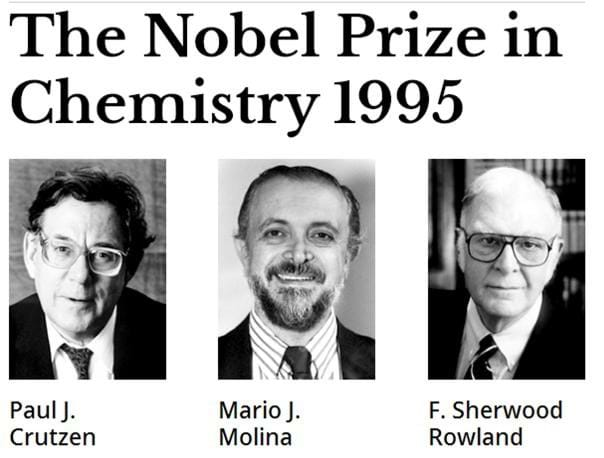Day 94: Scrubbing up nicely

29th August 2014
Author: Geoff Maitland, IChemE President 2014–2015.
In 1974, a paper, published in Nature, identified the role of chlorofluorocarbons (CFCs) in causing ozone depletion. This marked an important point in understanding the impact of human activity on our planet.
In recognition of this breakthrough in understanding, Professor Paul Crutzen, Professor F. Sherwood Rowland and Professor Mario Molina were awarded the 1995 Nobel Prize in Chemistry.
Professor Molina started his scientific career with a chemical engineering degree (1965) from the Universidad Nacional Autonoma de Mexico.
This year, 2014, marks 40 years since this paper was published and 20 years since the UN General Assembly declared 16 September as the International Day for the Preservation of the Ozone Layer. This is to commemorate the Montreal Protocol on Substances that Deplete the Ozone Layer (resolution 49/114), signed on this day in 1987.
Many of the chemical substances (eg CFCs) detailed for control in the Montreal Protocol have now been phased out. By 2030, CFCs will have been phased out. Chemical engineers have played an important role in achieving this.
The most significant ozone depleting substance today is nitrous oxide. This is more widely known as a greenhouse gas. At ground level (the troposphere), nitrogen oxides (NOx), produce ozone; both cause of respiratory problems and are components of urban smog.
Higher up in our atmosphere (in the stratosphere), ozone provides a vital protection barrier but it is destroyed by NOx.

I think these points are an important reminder that the phrase “out of sight, out of mind” is not true. Just because we can’t see ozone or NOx does not mean we can be complacent about them.
There has been much coverage of reducing harmful emissions from cars and other road vehicles. On a far bigger scale there is a lot of work to reduce these emissions from power stations.
In 2016, new European Union emissions levels will be enforced. In preparation for this, power plants across Europe are working to upgrade boilers and retrofit NOx scrubbing systems.
EDF Energy is upgrading the boilers at its Krakow and Wroclaw coal-fired power plants. New low-NOx burners will be fitted in addition to Selective Catalytic Reduction (SCR) systems. These measures will reduce NOx emissions by over 60 per cent.
Chemical engineers have played an important role in understanding the impact of human activity on the environment. The profession will play a continuing role in mitigating our effects through the development of new technology and new processes.
ChemEng365 blog
Geoff Maitland launched this blog during his IChemE presidency in 2014. ChemEng365 features 365 chemical engineering successes and achievements throughout his year-long presidency.